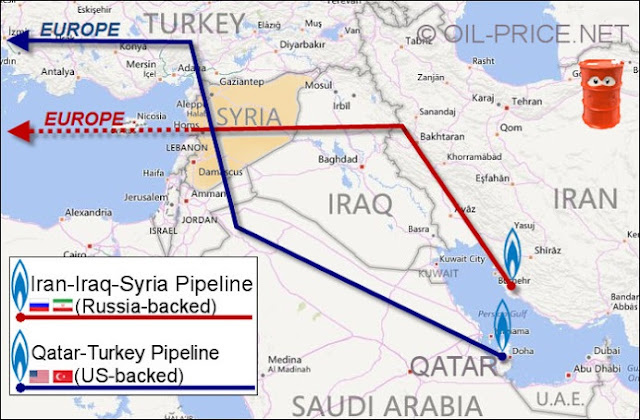Petroleum politics have been an increasingly important aspect of diplomacy since the rise of the petroleum industry in the Middle East in the early 20th century. As competition continues for a vital resource, the strategic calculations of major and minor countries alike place prominent emphasis on the pumping, refining, transport, sale and use of petroleum products.
In 1950, the seven main energy companies were BP, Chevron, Exxon, Gulf, Mobil, Shell, and Texaco. Together, they controlled 85% of global oil production.[1]
Journalist Pepe Escobar has written extensively about "Pipelinistan" i.e. the geopolitical situation surrounding the various "-stan" countries in the Middle East as it relates to oil and natural gas pipelines.[2][3]
Syrian Civil War
In addition to the fact that the Syrian Arab Republic is an anti-imperialist state led by a Ba'athist political party, petroleum politics also contribute to the strife in Syria, as indicated by this map of competing pipelines.[4]

Afghanistan
In 2018, even prior to taking state power in 2021, the Taliban vowed to protect the Turkmenistan, Afghanistan, Pakistan and India (TAPI) gas pipeline.[5]
Xinjiang, China
In addition to the Xinjiang region's geostrategic importance to China's economic development project, the Belt and Road Initiative, Xinjiang also has immense oil wealth.[6][7]
Nord Stream 2
The German-Russian Nord Stream 2 pipeline has been suspended at the behest of the US imperialists who wish to sell their Liquified Natural Gas (LNG) to Germany and prevent Russian access to European gas markets.[8]
References
- ↑ Vijay Prashad (2008). The Darker Nations: A People's History of the Third World: 'Caracas' (p. 178). [PDF] The New Press. ISBN 9781595583420 [LG]
- ↑ "Pipelineistan" on SourceWatch
- ↑ Inside US Afghanistan pullout, CIA opium ratline, pipeline conflict, new cold war (1:04:12) on The Grayzone
- ↑ Pipeline Politics in the Syrian Civil War
- ↑ Taliban Vows to Protect TAPI Gas Pipeline Project as reported by Voice of America, a CIA cut-out and propaganda outlet
- ↑ How oil has shaped Xinjiang by China Dialogue
- ↑ Inside US Afghanistan pullout, CIA opium ratline, pipeline conflict, new cold war (1:18:55) by The Grayzone
- ↑ Richard Medhurst (2022-03-02). "Germany Sends Weapons to Ukraine, Breaks with Neutrality" Rokfin.